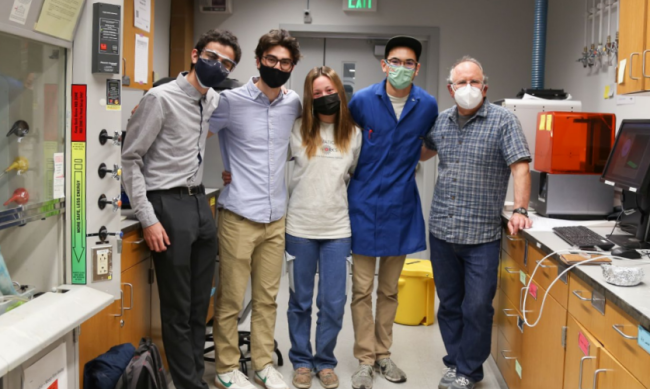Young Wizards of the MFL

In 2020, to address lab-access challenges presented by COVID, Microfluidics Lab (MFL) manager, Dave Bothman, began training a group of undergraduate engineering students he called the Workshop Wizards, to train lab users on equipment and do maintenance in the lab. “At that time, the height of the pandemic, a lot of people couldn’t come to the lab, so they would send designs of what they wanted to build, and the Wizards would build it and leave it outside for them to pick up,” Bothman says, adding, “The goal was to hire first- and second-year students with the expectation that when they became seniors, they would be working in campus research labs but still be available to train younger Wizards. Learning to use all the tools here and in the Innovation Lab [down the hall] would position them well to get good research internships and jobs.”
One of the lead Wizards is third-year undergraduate mechanical engineering major Andrew Furst, who says, “I love working on projects, working with my hands, troubleshooting, and coming up with solutions to problems. Working here, I get to interact with so many other researchers from so many different labs and fields of study, and they all involve engineering in some form and using the same resources for so many different purposes.
“Going from concept and design to a physical product and seeing it fit into their experiment, and then looking at their research paper and knowing that we had a small part in that is what I love most about it.” Furst’s wizarding duties get him involved with other labs around campus, and even across the country, making precision lab instruments, devices, and apparatuses that are not available off the shelf.
One recent project involved fabricating a nasal stent for a rhinoceros on the East Coast, to address a buildup of scar tissue in the animal’s nasal cavity, which had resulted from an infected tooth and had required several surgeries a year to remove. All four of the Workshop Wizards were involved in the process, which Furst describes as “communicating back and forth, figuring out which materials were bio-compatible, drafting different designs, coming up with different ways to produce the stent, and making it.”
“The Wizards is a great program, and one that we would like to expand,” Bothman says. ”Over the years, many groups on campus outside of engineering have really benefited from having engineers help in their labs. They bring a different perspective and skillset than the students in psychology or biology, and it works out great for everybody to work together.”